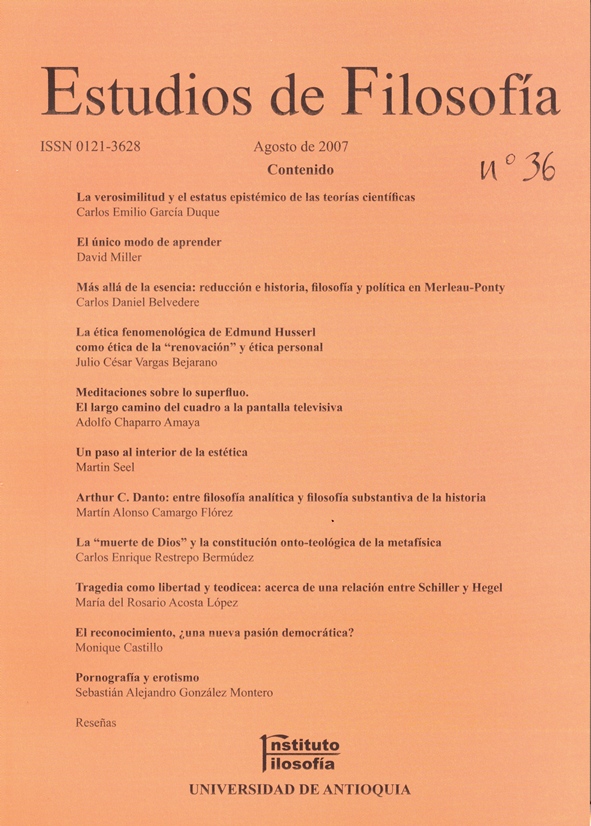Pornography and erotism
DOI:
https://doi.org/10.17533/udea.ef.12747Keywords:
Erotism, Pornography, desire, pleasure, sign, exchangeAbstract
This essay is born out of an intuition of Baudrillard according to which, in actuality, we attend a regime of image that imposes a certain way in which sexuality is related to the image of the body. In the plane of the image, the body is exhibited and, at the same time, a particular pretension to point to sex. Far from limiting itself to an intimate experience of desire, the image announces that sex has been detained in a symbolic relation that is characterized by the promise of the fetish, by the possibility of arousal and the compulsion to observe, the rest, as Baudrillard says, is literature. Well, in this essay both things are of equal interest to us. Through the concept of Erotism we try to perceive that which makes sexuality a radically internal experience; by means of the concept of Pornography we deal with the relation between the body, the image and sex. The first part dwells on the concept of Pornography as obscenity starting from the analysis done by Baudrillard in Seduction and in The Symbolic Exchange and Death. In the second part, we will try to show that the concept of Erotism can be understood as an interior experience and a conscience of the “betting on oneself”. The third part tries to put into play both concepts through the literary exercise of Miller and Jelinek with the goal of establishing the general frame of the problem of the delimitation between the Porno Image and Erotism as an interior experience. The final part is devoted to exposing some questions that arise of the contraposition from the concepts of Erotism and Pornography.
Downloads
References
BATAILLE, G. El abad C. Premia, México, 1978. 2.
____________. El culpable. Taurus, Madrid, 1974.
____________. El erotismo. Tusquets, Barcelona, 2005.
____________. Ensayos 1944–1961. Adriana Hidalgo, Buenos Aires, 2001.
____________. La experiencia interior. Taurus, Madrid, 1981.
____________. La littérature et le mal: Emily Bronte, Baudelaire, Michelet, Sade, Proust, Kafka, Genet. Gallimard, Paris, 1972
___________. Madame Edwarda. Premia Editora, México, 1978.
____________. Oeuvres complètes. Articles II 1950 – 1961. Gallimard, París, 1988.
____________. Sobre Nietzsche. Taurus, Madrid, 1979.
BAUDRILLARD, J. De la seducción. Cátedra, Madrid, 1989.
____________. El intercambio simbólico y la muerte. Monte Ávila, Caracas, Monte Ávila Editores, 1993.
GORCEN, P. El principio de lo obsceno. Roca, México, 1974.
GUBERN, R. La imagen pornográfica y otras perversiones ópticas. Anagrama, Barcelona, 2005.
FREUD, S. El fetichismo. En: Tres ensayos sobre teoría sexual. Alianza, Madrid, 1995.
HOLLIER, D. La prise de la Concorde. Essais sur George Bataille. Gallimard, París, 1974.
JELINEK, E. La pianista. Grijalbo, Barcelona, 1993.
____________. El deseo. Destino, Barcelona, 2005.
LAWRENCE, D. Pornografía y obscenidad. Nueva Visión, Buenos Aires,1967.
MAILLER, N. Henry Miller. Genio y lujuria. Grijalbo, Buenos Aires, 1976.
MACHEREY, P. Aquoi pense la littérature?Exercise de philosophie literaire. PUF, Paris, 1990. DOI: https://doi.org/10.3917/puf.mache.1990.01
MILLER, H. Trópico de capricornio. Plaza & Janés, Barcelona, 1993.
____________.Trópico de cáncer. Grove Press Black Cat Edition, NewYork,1961.
SADE, D. H. F. Obras completas. Corregidor, Buenos Aires, 1965.
SOLLERS, P. La escritura y la experiencia de los límites. Monte Ávila, Caracas, 1992.
Downloads
Published
How to Cite
Issue
Section
Categories
License
Copyright (c) 2007 Sebastián Alejandro González Montero

This work is licensed under a Creative Commons Attribution-NonCommercial-ShareAlike 4.0 International License.
Authors who publish with this journal agree to the following terms:
1. The Author retains copyright in the Work, where the term "Work" shall include all digital objects that may result in subsequent electronic publication or distribution.
2. Upon acceptance of the Work, the author shall grant to the Publisher the right of first publication of the Work.
3. The Author shall grant to the Publisher a nonexclusive perpetual right and license to publish, archive, and make accessible the Work in whole or in part in all forms of media now or hereafter known under a Creative Commons Attribution-NoCommercia-ShareAlike (CC BY-NC-SA 4.0), or its equivalent, which, for the avoidance of doubt, allows others to copy, distribute, and transmit the Work under the following conditions: (a) Attribution: Other users must attribute the Work in the manner specified by the author as indicated on the journal Web site;(b) Noncommercial: Other users (including Publisher) may not use this Work for commercial purposes;
4. The Author is able to enter into separate, additional contractual arrangements for the nonexclusive distribution of the journal's published version of the Work (e.g., post it to an institutional repository or publish it in a book), as long as there is provided in the document an acknowledgement of its initial publication in this journal;
5. Authors are permitted, and Estudios de Filosofía promotes, to post online the preprint manuscript of the Work in institutional repositories or on their Websites prior to and during the submission process, as it can lead to productive exchanges, as well as earlier and greater citation of published work (see The Effect of Open Access). Any such posting made before acceptance and publication of the Work is expected be updated upon publication to include a reference to the Estudios de Filosofía's assigned URL to the Article and its final published version in Estudios de Filosofía.















